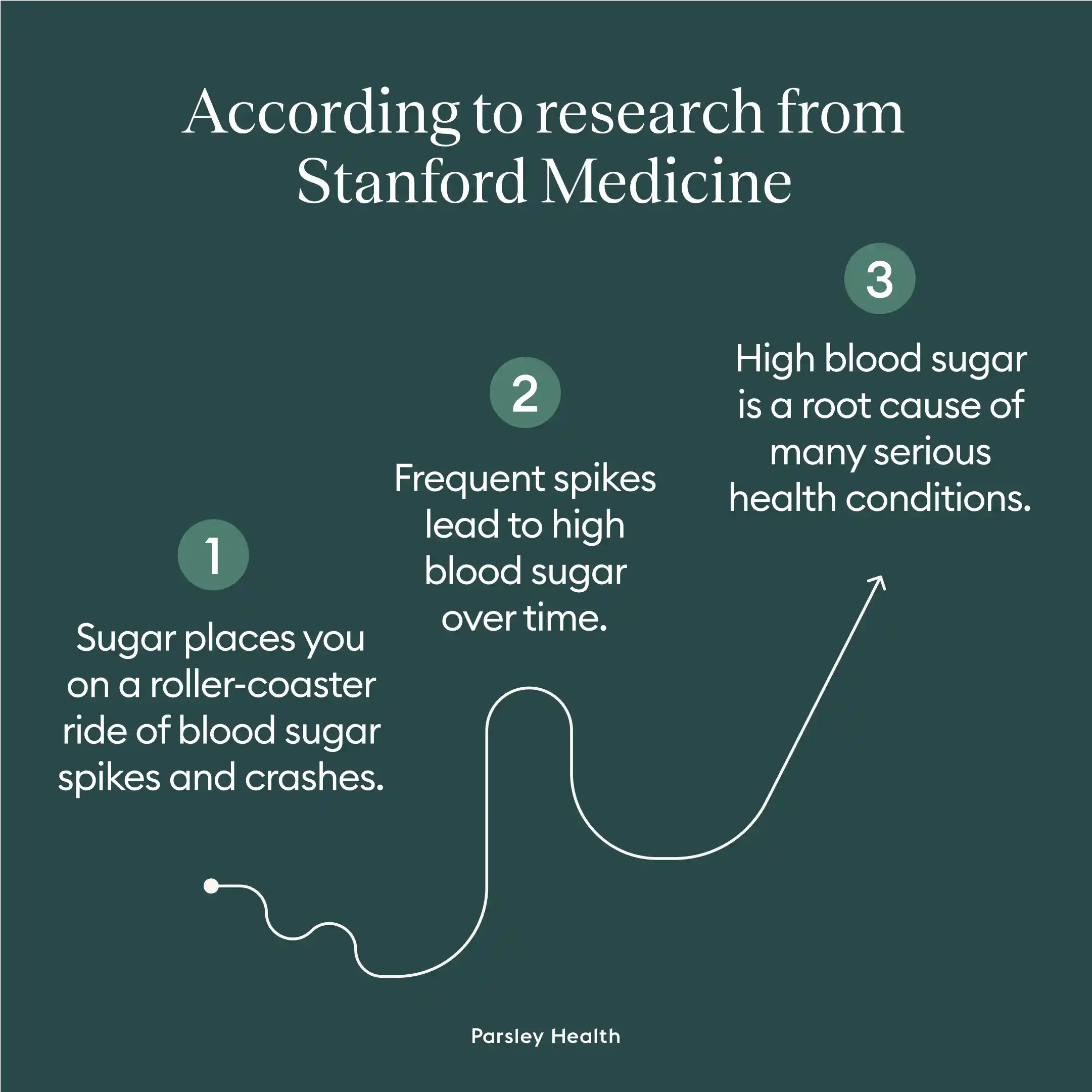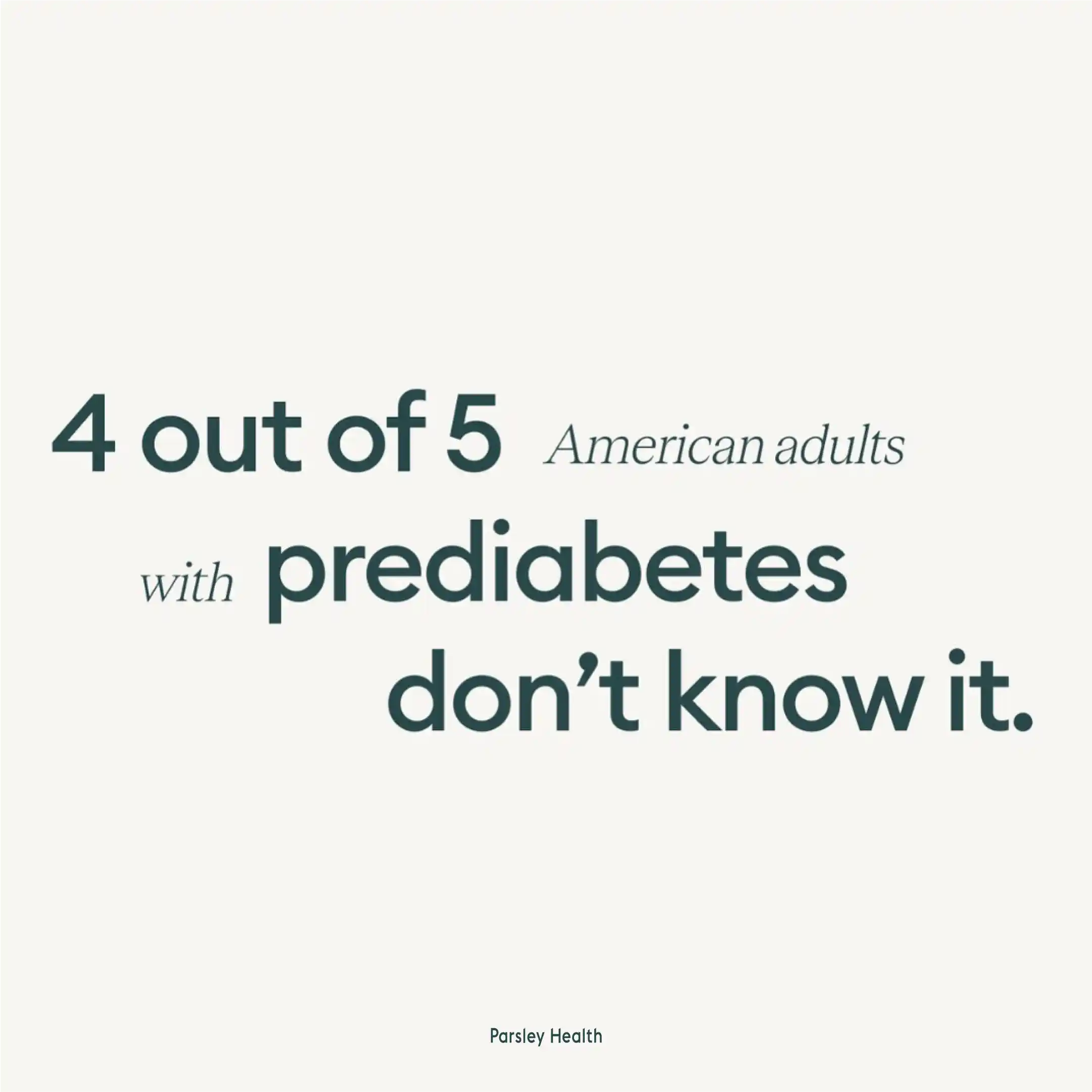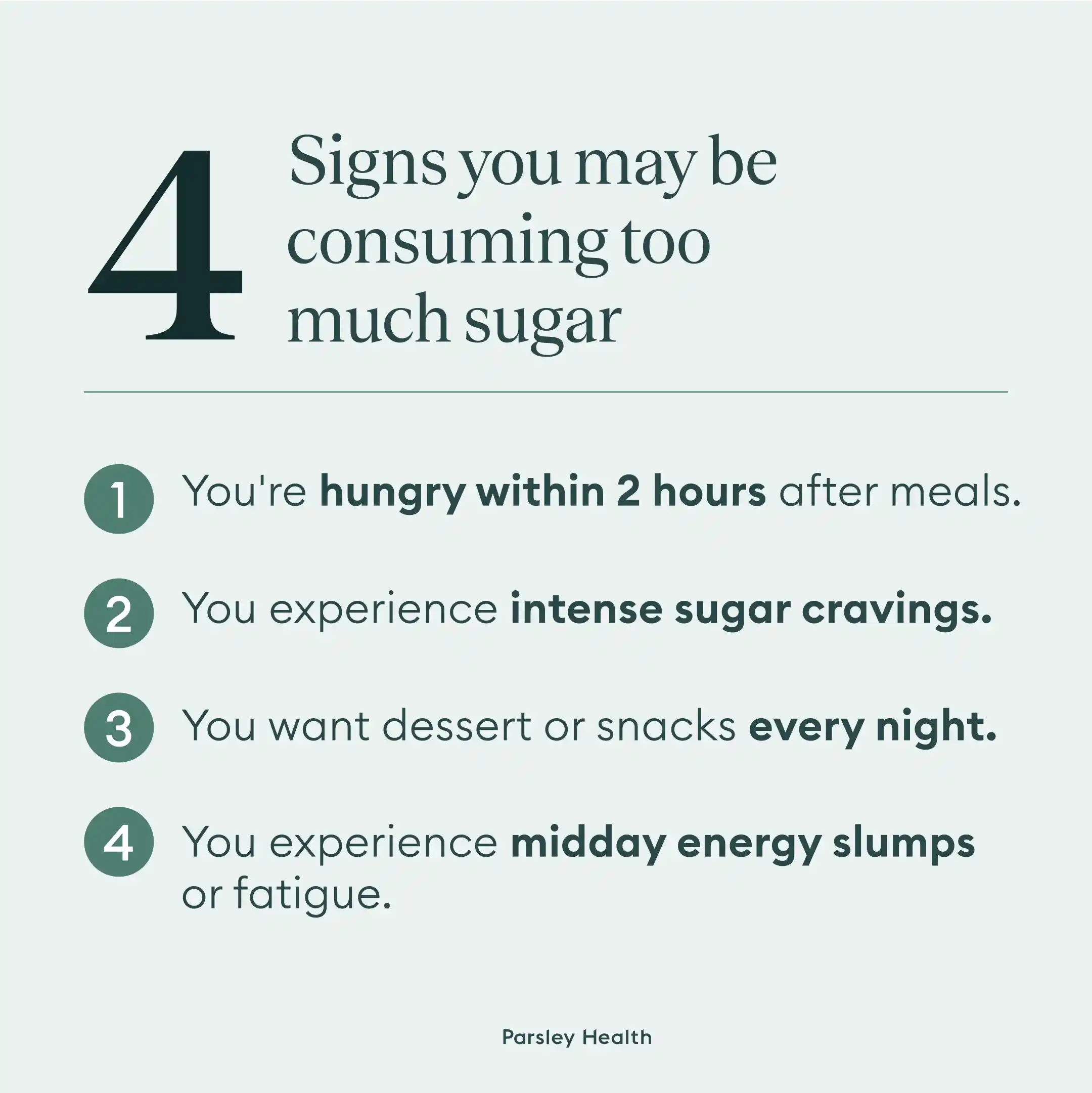Are you feeling tired, bloated, moody, or stuck in a cycle of constant cravings? Excess sugar could be the playing a role. Added sugars are woven into many modern diets—from breakfast foods to snacks to late-night treats—and over time, frequent sugar intake can affect energy levels, mood, metabolism, and overall health.
Raise your hand if you crave sugary cereal or pastries for breakfast, a sweet snack as an afternoon pick me up, and dessert after dinner. These seemingly small splurges can add up to a lot of sugar intake.
Sugar doesn’t just taste good; it also influences blood sugar and insulin levels. Repeated spikes and crashes can leave you feeling hungry, irritable, and foggy, which often leads to reaching for more quick carbohydrates. Over time, this pattern may contribute to insulin resistance and chronically elevated blood sugar—processes linked to conditions like type 2 diabetes and cardiovascular disease. But long before those diagnoses appear, many people simply feel “off.”

toxins are, reducing added sugar can help stabilize blood sugar, calm cravings, and support metabolic health. Naturally, this leads to common questions: how long does sugar stay in your system? And is it possible to get sugar out of your system quickly—or at least feel better faster?
To nix cravings, Parsley Health recommends doing a sugar detox. This involves eliminating refined sugar and simple carbs. You'll swap sugar for a more balanced macronutrient intake inclusive of whole foods. In doing so, you'll reverse some of the negative side effects of eating too much sugar.
In this guide, we’ll explain how sugar affects the body, what happens when you cut back, and realistic, evidence-based ways to reduce sugar intake without extreme restriction. We’ll also share how clinicians often approach sugar cravings and blood sugar balance as part of a sustainable, whole-body health plan—because lasting change works best when it’s personalized.
How much sugar is too much?
The average person in the United States consumes 34 teaspoons of added sugar per day, according to the United States Department of Agriculture (USDA), which releases the Dietary Guidelines for Americans.
The guidelines recommend getting no more than about 10 percent of your calories from sugar. For a 2,000-calorie diet, this would equal about 12 teaspoons per day. But even that amount is controversial. Metabolic health researchers say it's still too high and that the number should be lowered.

We eat dramatically more sugar than our ancestors did. For example, according to the USDA, one 12-ounce can of traditional soda, which can be consumed rather quickly, contains the amount of sugar people used to eat over five days 200 years ago.
Sugar in small amounts, such as having dessert on the rare occasion, is not generally harmful, according to the American Heart Association. However, the body doesn't need added sugars to function, and too much sugar consumption is a contributor to serious health conditions, energy slumps, and more.
Effects of sugar on the body and brain
The most immediate effect sugar has on your body is through its impact on your blood sugar.
Sugars are carbohydrates, and carbohydrates are one of the three macronutrients. The other two are protein and fat. Simple carbohydrates include bread, pasta, rice, cookies, crackers, chips, juice, soda, sweets, and added sugars.
Simple carbohydrates are absorbed into the bloodstream quickly, causing your glucose (blood sugar) level to rise. The rising glucose level signals the beta cells in your pancreas to release insulin. Insulin is a hormone that signals your cells to let glucose in for energy.
When we eat simple carbs, this process happens rather quickly. And in response to a spike, the pancreas can overcorrect with insulin to try to lower blood sugar.
When this happens, a sugar crash results in a phenomenon known as postprandial (after eating) reactive hypoglycemia. Reactive hypoglycemia can leave you with fatigue, brain fog, jitters, and nausea. It also fuels cravings, usually for foods that will again spike your blood sugar to give you quick energy and temporarily make you feel better.
But more sugar starts the process anew, placing you on a roller-coaster of blood sugar spikes followed by crashes followed by more cravings for sugary foods.
Our cells can get overwhelmed with insulin constantly telling them to take in glucose for energy. Eventually, filled with too much stored energy, they will stop reacting to insulin's signals.
They become what's called insulin resistant. The insulin-producing cells in the pancreas can also get overworked and stop producing as much insulin, compounding the issue.
Over time, insulin resistance leads to consistently high blood sugar. High blood sugar leads to the development of prediabetes and Type 2 diabetes. High blood sugar also fuels the development of preventable cardiovascular disease and is a risk factor for dementia and cancer.
In addition, sugar consumption feeds the "bad" microbes present in your gut. Your gut is made up of trillions of bacteria and fungi and what you eat influences which microbes grow and multiply.
Sadly, bad microbes thrive on simple carbs, especially sugar. When you eat too much, you’re promoting the growth of candida. Too much of this yeast can cause brain fog, rashes, digestive issues, and more.
Sugar also impacts the immune system. Sugar will impact both innate immunity (your first line of defense) and adaptive immunity (your longer-lasting defense). Studies have shown that 100 grams of various types of sugar can significantly decrease the ability of neutrophils to engulf bacteria.
Overloading on sugar and refined carbs can also cause inflammation. Short-term inflammation is a good thing when your body is repairing a cut or a broken bone. But chronic inflammation, the kind that comes from consistently eating a sugar-packed, nutrient-lacking diet, can have serious long-term health implications.
Chronic inflammation is associated with heart disease, diabetes, cancer, eczema, arthritis, and bowel diseases like Crohn's and ulcerative colitis.
The good news is you can reduce inflammation and improve your body's blood sugar response by changing your diet and cutting out the sugary foods that are negatively impacting you.
Benefits of a sugar detox
If you’re constantly feeling low energy, experiencing unexplained digestive issues, or regularly complaining of brain fog, consider evaluating how much sugar you're consuming. You may wish to detox from sugar.
"Detox" and "cleanse" are trendy wellness terms. Your body has natural detox mechanisms built in, and you technically don't need to "detox" or "cleanse."
The true goal here is to eliminate added sugar and processed carbs from your diet as much as possible and incorporate strategies to slow glucose absorption into the bloodstream. Think of the process as more of a reset and a sustainable lifestyle change for optimizing your health rather than a quick fix.
Reducing intake of simple carbs can help you make your body more insulin sensitive—which is a good thing. Doing so helps stop the vicious cycle of blood sugar spikes and crashes followed by cravings.
The first step is reducing or eliminating processed foods, which are often loaded with added sugar. You'll also need to reduce or eliminate your intake of refined carbohydrates (e.g., breads, pastas, rice) and sauces. Many store-bought sauces, dressings, marinades, and condiments have added sugar.
By reducing these foods, your intake will naturally shift to include more real, whole foods such as fresh fruits, vegetables, nuts, seeds, whole (unprocessed) grains, and high-quality, pasture-raised meat, eggs, and seafood (if you eat animal products).
Whole plant-based foods specifically can naturally help to regulate blood sugar and promote greater satiety because they contain greater amounts of fiber.
Adding more fiber to your diet can help slow the rate at which glucose is released into the bloodstream from the food you eat and leave you feeling more satisfied after a meal or snack. Fiber has the added benefit of feeding your beneficial gut bacteria.
Focusing more on whole foods and less on packaged and refined foods can therefore naturally help to improve digestion, lower inflammation, and boost your energy and mood.
Research supports this process. In a 2021 study published in the Journal of Behavioral Addictions showed the effects of a 30-day intervention to reduce sugar intake in 128 adults. The researchers found that the intervention reduced cravings and psychological distress and helped with weight management.
How to reduce your sugar intake
1. Start slow
A sugar detox implies a total elimination of sugar, but that may not be as simple as it sounds if you’re used to eating sweet foods or lots of carbohydrates in general.
Parsley Health doctors and other providers say you can start slower by including only one or two foods in your daily diet that contain added sugar (such as a small snack or sweetened coffee creamer).
Slowly wean yourself off of sugar and these remaining sugar-containing products over the course of two weeks.
It’s often the small, consistent steps that lead to lasting change. That’s why, at Parsley Health, our clinicians pair this steady approach with functional labs and one-on-one care to help women understand how blood sugar swings may connect with symptoms like fatigue, bloating, or mood dips.
For the initial weaning period, Parsley recommends cutting back to no more than 6 teaspoons (24 grams of sugar) for those assigned female at birth and no more than 9 teaspoons (36 grams) for those assigned male. These recommendations match those of the American Heart Association.
In lieu of refined sugar, focus more on whole, complex carbs in the forms of fruits, such as berries, apples, and grapefruit. Pile on the veggies, as well.
Sweet potatoes and squash can help with carbohydrate cravings since they are healthier carbs. Swap pasta and rice for whole grains such as quinoa, which is loaded with protein and helps with feeling full. Legumes, such as lentils and beans, are also beneficial for their fiber.
2. Do a 5-day sugar cleanse
Once you’ve mastered lowering your sugar intake with the above two-week weaning strategy, conquer the next challenge. Aim for five full days without refined sugar.
Our Parsley 5-Day Clear Mind and Body Reset makes it easy by giving you a shopping list and recipes for five days of sugar-free meals and snacks.
You'll likely notice an impact on your energy level, mood, and quality of your digestion. Plus, your cravings will change. Instead of craving snacks laden with added sugar, you might just find yourself craving berries or other fruits for a dose of sweetness.
While reset-style plans can kickstart change, real breakthroughs often come from looking underneath the surface. That’s where Parsley’s functional medicine model shines—integrating clinical discussions and lab markers to personalize support for hormone balance, gut health, or inflammation alongside lifestyle shifts.
3. Balance your plate
Eating lots of fiber, protein, and healthy fat will be essential as you transition off of a sugar-rich diet.
Having enough of these nutrients will ensure you’re left feeling satisfied after each meal. They will also help you balance blood sugar and meet your daily nutritional needs.
The Diabetes Plate method, by the American Diabetes Association, is a reliable tool for compiling balanced, nutrient-dense, and delicious meals.
Follow the Diabetes Plate method
Ensure half of your plate is filled with non-starchy vegetables, including dark leafy greens, kale, spinach, broccoli, and Brussels sprouts—to name a few. This should be equivalent to about 2 to 3 cups of non-starchy veggies.
One of the remaining quarters of your plate should contain your protein choice. Plant-based protein options include beans, lentils, quinoa, and more. Healthy animal proteins include pasture-raised poultry and eggs, grass-fed beef, or sustainably sourced seafood.
The final quarter of your plate should contain your complex carbohydrate choice, such as a half-cup serving of a whole grain, starchy vegetable, or fruit.
Top your meal with 1 to 2 tablespoons of healthy fat such as nuts, seeds, olives, avocado, or high quality oils such as olive or avocado. Out of the three macronutrients, protein keeps you satiated for the longest, and healthy fats help slow digestion, making you feel fuller for longer.
4. Drink enough water
Staying well hydrated is important all of the time. Water supports your vital organs, such as the liver, kidneys, lungs, intestines and skin. Drinking more water is essential when increasing fiber intake to help support bowel movements.
At Parsley Health we recommend drinking at least 64 ounces of water daily and more if you’re experiencing additional fluid loss through regular sweating. Be aware of the dehydrating and diuretic effects of caffeine.
Remember that alcohol also contains sugar. So abstaining from it can help support your goals.
5. Move your body
Exercise boosts your energy and helps increase insulin sensitivity. Physical activity helps move sugar into your muscles for storage without the need for insulin release. Building and preserving muscle mass through resistance training also helps your body manage glucose levels more efficiently.
Parsley clinicians and providers recommend aiming for the Department of Health and Human Services exercise guidelines.
Exercise goals
- 150 minutes of moderate aerobic activity, or
- 75 minutes of vigorous aerobic activity per week
- strength training at least two days per week
For strength training exercises, incorporate routines for all major muscle groups using weights or resistance bands.
6. Eat mindfully on a sugar cleanse
Incorporating mindfulness at mealtimes is a way to make more attentive decisions around your dietary choices in general.
Mindful eating promotes enjoyment around food, which can contribute to healthier eating habits.
At Parsley Health, we recommend eating slowly and taking several deep breaths before starting a meal. Chewing your food thoroughly and eat in an environment free from distractions, like electronic devices.
This will allow for more heightened awareness around hunger and fullness cues.

7. Track your symptoms and progress
As you’re going through the process of reducing your sugar intake, tracking your symptoms can be beneficial.
Pay specific attention to your mood, digestion, and energy.
Ask yourself these questions
- Are you less sluggish when you eliminate sugary or carb-heavy foods?
- Do you notice a difference in your gut health symptoms, such as bloating?
- Are your cravings changing in frequency and type?
- Do your meals make you feel more satisfied?
- Are you snacking less?
Keep track in a journal, with as much detail as possible. Include your mealtimes, portions, what your bowel movements look like and how frequent they are, and how you feel following your meals and snacks.
Tracking is powerful, but even more so when you have a provider to bring those insights into conversation. Parsley clinicians often use what you notice day to day—as well as targeted functional labs—to craft a personalized, rooted care plan to support long-term sugar resilience.
Side effects of sugar withdrawal
You may experience some side effects as your body withdraws from reliance on sugar.
Side effects of cutting sugar
- Anxiety
- Brain fog
- Cravings
- Fatigue
- Headache
- Insomnia
- Irritability
- Nausea
How to manage side effects
Side effects from cutting out sugar can be challenging. But remember, just because you're eliminating added sugar and refined carbs as much as possible doesn't mean that you can't reach for a healthy sweet option.
If you're experiencing cravings, fatigue, nausea, or mood swings, add some berries and nuts to some plain Greek yogurt. Berries offer a sweet fix with a dose of fiber to slow glucose absorption. While the nuts and yogurt provide protein and health fat for additional satisfaction.
Side effects should be temporary and lessen within a few days. They will likely disappear within a week or two. So hang in there.
Tips and tricks of keeping a sugar-free lifestyle
After you go through your sugar-eliminating process, you will likely find that you feel better with boosted energy, reduced cravings, and improved gut health.
Deciding to never eat any sugar again is likely an unsustainable plan. You may want a piece of cake on your birthday, for example. And there's nothing wrong with that.
Instead, focus on sustainable eating habits. Opting for whole foods rather than processed whenever possible will naturally help you maintain your new health gains after your sugar detox.
Read food labels and menu descriptions thoroughly. Sugar goes by many different names. The American Heart Association has a handy guide.
FAQ about Sugar Detox & Flushing Sugar Out of Your System
How long does it take to flush out sugar from your body?
You don't need to "flush" sugar from your body. In fact, that would be impossible. Even if you only eat protein and fat, your body can convert these macronutrients into usable forms of glucose, which your brain and body definitely need.
What foods flush sugar out of your system?
Nothing you eat or drink can "flush" sugar out of your system. Your brain and body require glucose to operate, and your body can and will make usable forms of glucose from other macronutrients when it needs to.
What happens after 2 weeks of no sugar?
If you're wondering how much time is needed to change your sugar cravings and help reset how your body processes blood sugar, you may notice changes in as little as two weeks, with additional changes occurring over time.
However, if you go back to eating lots of sugar and refined carbs, you'll likely notice unwanted symptoms returning.
What are the signs of too much sugar?
You may be consuming too much sugar if you experience the following.
- You're hungry within two hours after eating.
- You experience intense sugar cravings.
- You want dessert or snacks every night.
- You experience midday energy slumps or fatigue.

If you experience the following symptoms, you should talk to your doctor.
- Blurred vision
- Excessive urination
- Excessive or unexplainable thirst











